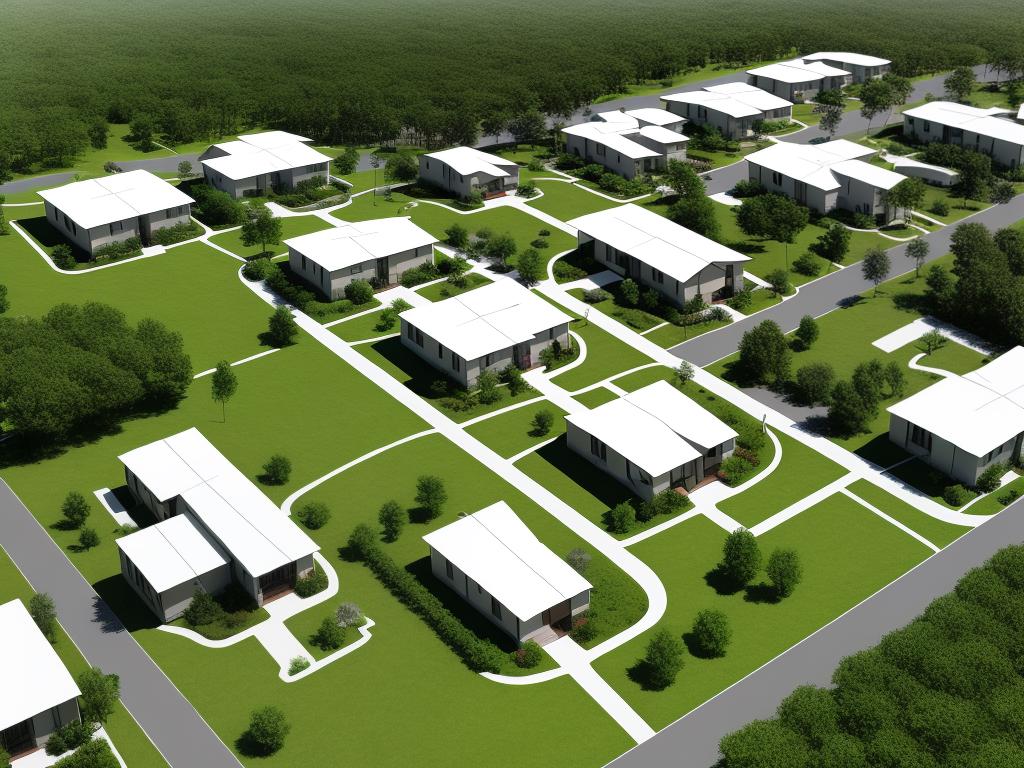Both seasoned investors and newcomers to the business may feel lost in the constant flux of today’s real estate market. With a wide range of elements considered, our investigation uncovers the unseen realities of the 2023 housing market. The adoption of sustainable real estate practices, as well as revolutionary technological advances, have the potential to radically alter the real estate industry, along with the market as a whole. The real estate market in 2023 is expected to be challenging, but this article promises to arm you with useful insights and actionable advice to help smooth the way.
Predicted Market Trends for 2023
Projected Housing Prices in 2023
As we look ahead to 2023, projections indicate that housing prices are expected to continue on their upward trajectory. Factors such as continued population growth, low-interest rates, and a general shortage of housing supply largely contribute to this trend. Potential homebuyers should be prepared for this reality and budget accordingly when considering purchasing a new home.
Changes in Real Estate Laws and Regulations
Changes in real estate laws and regulations could also have a considerable impact on the housing market in 2023. The administration has indicated some future steps, which could include tax reforms influencing homeownership’s financial advantages and stricter regulations on mortgage lending, potentially making it more challenging for some prospective buyers to secure loans.
In addition to federal regulation, state and local policies will also shape the 2023 market. Issues such as rent control, zoning laws, and housing affordability initiatives are generously discussed at these levels and could significantly influence the market in different regions.
Investment Opportunities in Real Estate
As the housing market continues to develop, several investment opportunities are expected to arise in 2023. Despite high prices, real estate remains a stable and generally reliable form of investment. Investing in rental properties, for example, could provide steady income, especially in high-demand areas.
Additionally, some experts predict that the market for commercial real estate may rebound as businesses begin to recover from the economic effects of the Covid-19 pandemic. That said, potential investors should diligently review local market conditions and trends to determine the most promising opportunities.
Impact on Buyers and Sellers
As for potential impacts on buyers and sellers, the rising housing prices anticipated for 2023 could present challenges and opportunities for both groups.
For sellers, the high prices could result in substantial profits, especially for those who bought their properties several years ago. However, the flip side is that if they’re planning to buy another house in the same market, they may face steep prices themselves.
For buyers, high housing prices could make homeownership less attainable, especially for first-time buyers. This could lead to an increased demand for rental properties, potentially driving up rent prices as well. However, low-interest rates could partially offset these high prices, at least in the short term.
Drawing to a Close
Undoubtedly, there’s a certain level of uncertainty inherent to any market forecast. However, current indications signal that the trajectory of increasing housing prices, amendments in regulations, and unseen investment opportunities will persist into 2023. It’s critical for both potential buyers and sellers to comprehend this market landscape and thoroughly evaluate their choices.

Impact of Economic Factors on the Housing Market
The Impact of Inflation on the Housing Market in 2023
Inflation, characterized by a surge in the general price level of commodities and services, has a complex impact on the housing landscape. As the expense of essential manufacturing materials like steel, and lumber among others escalates, these costs are inevitably passed on to the potential homebuyers by developers and contractors. Inflation also bears direct implications on property taxes, which are intrinsically tied to housing costs. As such, with the rise in inflation, property taxes follow suit, thus amplifying the overall homeownership expense.
Besides, in the event of significant inflation growth, it’s probable that the Federal Reserve will respond by hiking interest rates to keep it in check. This action may result in a noticeable increase in the cost of property loans, which could dissuade prospective buyers, and in turn, possibly cause a decrease in home prices. Therefore, if inflation continues to escalate at a substantial rate, the housing market in 2023 could witness a deceleration.
Interest Rate Influence on the 2023 Housing Market
Interest rates are a crucial factor in the housing market because they significantly impact mortgage rates. When interest rates are low, mortgage rates follow suit, making it more affordable to purchase homes. When these rates are high, the cost of buying a home or investing in real estate increases, and generally, demand lowers.
The forecast for 2023 is indicating the possibility of a rise in interest rates. If the Federal Reserve does increase the rates, the affordability of homes will be affected. Potential homeowners might find the higher mortgage payments unmanageable, leading to a decrease in demand. This decrease may also lead to stagnation or a decrease in house prices.
Impact of Employment Levels on the 2023 Housing Market
The levels of employment also play a significant role in influencing the housing market. Higher employment levels typically lead to increased demand for housing as more people have the financial stability to purchase a home.
Predictions for 2023 indicate that the job market recovery from the COVID-19 pandemic will continue. This bodes well for the housing market, as increased employment could lead to increased demand for housing. However, specific sectors that have been notably affected, such as the tourism and entertainment industry, may witness a slower recovery. This could affect the housing market in areas where these industries dominate.
Global Economy’s Impact on the 2023 Housing Market
The global economy also has an influential role in shaping the housing market. For instance, the rise of remote work and the digitization of multiple industries have changed the way homes are valued and sought after.
In 2023, if global economic conditions continue to improve post-pandemic, there could be a capital flight to safety—meaning investors refuge their capital away from volatile markets, like stocks, and instead invest it in stable options, like U.S. real estate. This would mean an increase in foreign buyers, causing an upswing in demand and housing prices.
However, any potential global economic downturn or instability can reverse this situation, leading to a decreased demand for houses, especially high-end and luxury properties.
As we look forward to 2023, it becomes clear that multiple economic factors are poised to impact the housing market. Early predictions suggest we may encounter minor inflation and potential hikes in interest rates, which could potentially temper the buoyancy of the market. Nevertheless, an expected recovery in job sectors combined with hopeful signs of a globally improving economy gives cause for cautious optimism. Tracking these economic trends will be critical as we navigate through the fluctuating real estate conditions of 2023.

Affordability Crisis and Housing Bubble
A significant cloud hanging over the rousing forecast for the 2023 real estate market is the encroaching affordability crisis. The sharp incline in home prices, combined with the slow pace of wage growth, has considerably diminished the general affordability of homes for a vast number of US residents.
Since the devastating fallout of the 2008 housing market crash, the US housing scene has demonstrated consistent growth. The unexpected challenge of the global COVID-19 pandemic did nothing to slow this meteoric rise. Limited supply and amplified demand continued to drive prices up, turning the dream of homeownership into a distant prospect for many, notably for those from economically disadvantaged backgrounds.
This affordability crisis isn’t confined to property ownership. The rental market is also feeling its effects. As home purchases become increasingly unaffordable, people are being pushed towards rentals, causing a parallel surge in rental prices. Thus, a vicious cycle of unaffordability has been set in motion.
The shortage of affordable housing poses serious financial challenges for many households, which could potentially trigger larger-scale economic repercussions. Moreover, these trends are further widening social and economic gaps, fuelling societal divisions and growing financial inequality.
The 2023 Housing Bubble
The affordability crisis brings us to the next alarming concern: the risk of a housing bubble in 2023. Similar to what occurred in the mid-2000s, rapid price increases, fueled by speculative activity, low-interest rates, and lax lending standards, could lead to an unsustainable housing market, commonly referred to as a housing bubble.
A housing bubble typically starts with an increase in demand, within an environment of limited supply, which leads to a rapid increase in housing prices. These elevated prices then lead to increased lending, often to customers who may not have strong credit profiles. As lending increases, so does consumers’ purchasing power, leading to further demand and perpetuating the cycle.
However, the bubble eventually bursts when the prices are driven to such high levels that they’re not sustainable. In short, demand decreases, or stagnates, while supply increases, leading to a sharp drop in prices, often leaving homeowners with negative equity, which can be disastrous for economies relying heavily on the real estate market.
Emerging Consequences
The possible emergence of a housing bubble in 2023 has the potential to give rise to severe difficulties. A burst of this bubble could leave homeowners unable to fulfill their mortgage obligations, triggering a surge in home foreclosures. This scenario carries shades of the 2008 housing market collapse, where countless Americans were displaced, ushering in a financial disaster.
Many specialists also express concerns about the ripple effects this could have on the broader economy, setting off a possible recession. This could worsen the existing affordability crisis, either by rendering homeownership an unreachable dream for many, or by leaving those who are able to purchase a home in a precarious financial state.
In summary, two key issues to be monitored closely in 2023 are the affordability crisis and the potential housing bubble. These challenges call for well-considered policy amendments, prudent market oversight, and the encouragement of affordable housing options.

Photo by rarchitecture_melbourne on Unsplash
Sustainable Real Estate Development in 2023
There will be a marked change in 2023 towards eco-friendly and sustainable building practices. This pertains, in particular, to the building and layout of homes that minimize their impact on the environment. As people become more aware of environmental problems like climate change and global warming, there have been major moves towards more sustainable practices when designing our homes.
Promotion of Eco-Friendly Residences
As people learn more about the environment and become more concerned about it, developers and builders are moving towards more eco-friendly practices. Renewable energy systems like solar panels, wind machines, and geothermal energy are now being built into homes. Also, the focus is on using appliances that use less energy, improved insulation methods, and building materials that don’t harm the environment.
Multi-use developments are also becoming more popular. These developments include a mix of residential, commercial, and green areas. They mix housing, transportation, and amenities, so people don’t have to drive long distances and use as much fuel. Such steps not only help protect the environment but also improve the quality of life for the people who live there.
Regulations and Sustainable Development Strategy
Government regulations globally are actively promoting sustainable development. Policies and programs like Energy Star, LEED certification, and other building codes and standards have been set. Such regulations compel developers to adhere to energy-efficient and eco-friendly construction standards.
For instance, California intends to create a statewide network of zero-net energy buildings, thereby significantly conserving energy. Developers and builders who incorporate these elements not only assist in Environmental, Social, and Corporate Governance (ESG) efforts but also stay on top of regulatory compliance and enhance their reputation in the market.
Sustainable Development Attracting Investors
Real estate investors are also becoming more drawn towards sustainable real estate development. The surge can be attributed, in part, to the rise in ESG investing. Investors recognize that they can align their investment portfolio with their social and environmental values. They are increasingly realizing that environmentally friendly properties are likely to have higher market values, lower operating costs, and limited risks.
Future-proofing investments by choosing environmental, resilient, and sustainable properties gives an edge in a competitive market. As the climate risks become more palpable, properties uninfluenced by these risks tend to appreciate in value at a higher rate. Furthermore, sustainable properties attract a broader range of potential tenants and buyers, increasing their marketability.
Preparing for a Green Housing Market in 2023
Emerging projections suggest that the primary theme for the 2023 housing market will be the shift towards more sustainable and eco-friendly real estate development. This transition is driven by growing environmental concerns and is expected to notably reshape the face of the housing market. Adapting to these changes requires an understanding that the benefits of such progress extend beyond economic growth. These eco-friendly practices enhance our quality of life and contribute positively to our planet’s sustainability efforts.

Effects of Technology Advances on Real Estate
Virtual Reality: Revolutionizing the 2023 Housing Market
As we get ready to enter this new era of sustainable growth, the use of virtual reality (VR) is another thing that will have a big effect on the housing market in 2023. In a world where travel is still hard and where COVID-19 hasn’t happened yet, VR lets potential buyers or renters actually visit a property anywhere in the world. This gets rid of the old geographical barriers.
But VR has more effects than just helping people find a house. With this technology, architects and real estate developers can simulate a complicated, three-dimensional walkthrough of buildings that are still in the planning stages. This feature not only helps them make changes quickly during the planning stage, but it also puts them in a unique situation to sell real estate properties before construction even starts.
Artificial Intelligence and Machine Learning Enhancing Real Estate Practices
AI and ML technologies could speed up and improve the real estate business. AI can analyze huge amounts of data in seconds, which would take a person hours to do. This skill can be used to predict future market trends, which can help real estate investors and renters decide when is the best time to buy or sell a home.
AI chatbots can also be used to improve customer service by answering questions and giving information 24/7, which helps strengthen the relationship between the client and the helper.
Machine learning can make property valuations even more accurate. The value of a property can be predicted more correctly with the help of advanced algorithms that look at past sales, location, nearby amenities, and property details.
Blockchain and Real Estate Transactions
Blockchain technology, the backbone of cryptocurrencies, is starting to transform the real estate market. One of its key advantages in real estate is improving the speed, efficiency, and security of transactions.
Traditionally, purchasing a property can be a long and complicated process involving multiple intermediaries such as escrow companies, banks, and notaries. With blockchain, all these steps could be consolidated into a single, seamless, and transparent process.
Smart contracts – one of the applications of blockchain technology – automate contract execution once terms and conditions have been met, which can substantially shortcut the whole purchasing process.
However, blockchain isn’t without issues. Its adoption in the real estate industry has been relatively slow due to regulatory challenges, the price volatility of cryptocurrencies, and the public’s limited understanding of the technology. But with further advances and wider acceptance, blockchain may change the real estate transaction landscape drastically by 2023.
Final Thoughts
To sum up, improvements in technology like Virtual Reality, AI, Machine Learning, and bitcoin have helped change the real estate housing market in important ways. A field with a lot of promise to improve how properties are shown to clients, how data is interpreted, and how transactions are done. But each new development comes with its own set of problems and unknowns. So, if you want to invest in real estate in this exciting time of technological change, you need to know a lot about its possible benefits and risks.

Navigating the 2023 Housing Market
Assessing the Terrain
The landscape of the housing market in 2023 has undergone a dramatic transformation from its previous avatar, influenced by various factors such as the yield curve inversion in 2019, the persisting aftereffects of the COVID-19 pandemic, rapid strides in technology, alterations in legislations, and geopolitical ripples. Grasping this changed reality and adapting to the ever-evolving conditions of the market becomes essential to navigate this dynamic environment successfully.
Home-Buying Strategies in 2023
A significant change in the 2023 housing market has been the rise in home prices driven by low inventory and high demand. As a potential buyer, staying patient during this time may be beneficial. Keep a close watch on market trends, be ready for bidding wars, consider getting pre-approved for a loan to speed up the financing process, and be adaptable with your location and property type choice. Use technology tools to view and compare various options. Utilize professional realtors to navigate through the complexities.
Tips for Selling Properties in 2023
Even though prices are higher, buyers are not always in a better position. Because prices have gone up and it’s harder to get a loan, the number of people who can buy has gone down. Home staging and professional photos for web listings are more important than ever if you want to sell a house. The way you negotiate and how you pay can make or break a deal. It’s also important to find the right buyers, which could be people who work from home and want to move out of expensive cities and into suburbs or rural areas because telecommuting is becoming more common.
Investing Wisely in the 2023 Housing Market
Investing in the housing market in 2023 offers potential benefits but also risks. Diversification in terms of location and type of property can reduce risks associated with local market fluctuations. Investors are also turning to Real Estate Investment Trusts (REITs) to spread the risk. Real estate tech start-ups are reshaping investment avenues offering crowdfunded real estate investing and fractional property investment options.
Challenges and Opportunities
There are several challenges in the 2023 housing market. These include high prices, low inventory, stricter loan approval processes, and the effect of geopolitical tensions on interest rates. Yet, there are also opportunities. The work-from-home trend has opened up new markets as people relocate. The rise in prices means the potential for high returns on investment. Technological advancements have made property viewing, comparing, buying, selling, and investing more efficient and cost-effective.
The Hidden Truth
The real but often overlooked fact is that the housing market is cyclical. The high rates of appreciation witnessed in 2021 and 2022 are not sustainable over the long term. Prices have plateaued and in some areas started to fall. It’s essential to adopt a long-term perspective when participating in the housing market. The key is adaptability, staying informed, having a clear understanding of individual financial circumstances, and making decisions based on thorough analysis rather than emotion.
In conclusion, the 2023 housing market is filled with both uncertainties and possibilities. The best approach is to stay informed, stay patient, and be adaptable. Whether you are a home buyer, a seller, or an investor, it’s your careful planning and decision-making that will make all the difference in successfully navigating the real estate market of 2023.

Looking toward the future of real estate, it is clear that 2023 will be a year of transformation and potential turbulence. Yet, it also presents numerous opportunities for individuals ready to harness these shifts in the market. Regardless of the unpredictability brought about by economic factors, the advancing technology age, or the continued push for sustainable development, the real estate market continues to be an arena of great potential. Therefore, as we navigate and make sense of this continually evolving industry, it becomes even more crucial to stay informed, proactive, and strategic, to make the most of what the 2023 real estate market has to offer.

